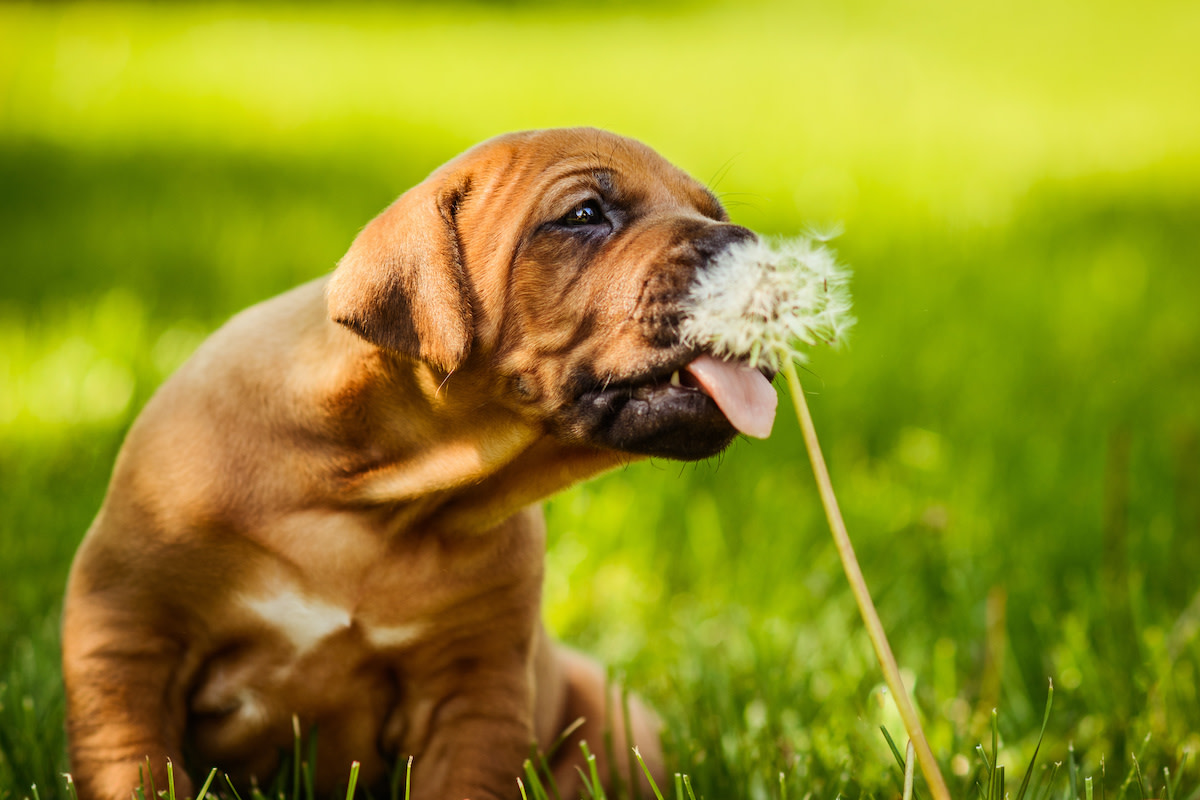Can Dogs Eat Dandelions? The Benefits of Dandelion Greens
Written by MasterClass
Last updated: Mar 24, 2022 • 3 min read
Dandelions can be a nutritious treat for your dog; however, there are health risks to consider, too. Read on to weigh the benefits and hazards before you include dandelions as a supplement in your furry friend’s diet.
Learn From the Best
Can Dogs Eat Dandelions?
Dogs can eat dandelions in small amounts to reap their health benefits. An edible member of the sunflower family of plants, dandelions (Taraxacum officinale) might improve digestion and help dogs and people maintain a healthy immune system. Herbalists have long touted these and others as benefits of eating dandelions or sipping dandelion tea.
Edible Parts of the Dandelion Plant for Dogs
Dandelions are edible and nontoxic for dogs; however, some parts of the plant are more nutritious than others. Here are three of the most nutrient-dense parts of dandelions:
- Blooms: Dogs can consume the yellow flowers or seed puffs of dandelions. Dandelion blooms contain high levels of antioxidants and polyphenols. These nutrients might combat free radicals in your dog’s body and help to boost its immune system.
- Leaves: Dandelion greens and dandelion leaves are the most nutrient-dense part of the plant. You can add these greens to your dog’s meals to supplement the nutritional value of their regular kibble diet.
- Roots: Use dandelion root extract as a natural liver tonic to improve your pet’s liver function. Dandelion roots also have anti-inflammatory properties, which can improve your pet’s muscle recovery and decrease joint soreness.
3 Health Benefits of Dandelions for Dogs
Consider these health benefits your canine companion can enjoy from the occasional supplementation of natural dandelion flowers in their diet:
- 1. Boosted immune system: Dandelions contain vitamin A and several B-complex vitamins, which can help to improve your pet’s immune system and boost their energy levels. This can help your dog ward off infections and diseases.
- 2. Improved digestion: Dandelion contains inulin, a probiotic that can enhance your dog’s gut health and increase the number of good bacteria in your pet’s digestive tract. Add a few drops of dandelion tincture to your pet’s dog food servings to aid their digestion. A dandelion extract can improve gallbladder function and act as a laxative to remedy indigestion and maintain your dog’s body weight. As a natural diuretic, dandelion can reduce the chance of your dog gaining excess weight and suffering from the many health concerns that stem from obesity.
- 3. Strong bones and teeth: The essential minerals potassium and manganese work with calcium in your dog’s body to build strong bones and teeth.
3 Health Risks of Dandelions for Dogs
Dandelions are a generally low-risk, high-reward treat for your dog; however, there are potential adverse effects you should consider before allowing your dog to eat dandelions. Here are just a few health risks to keep in mind:
- 1. Constipation: Although dandelion is a generally safe diuretic, too many dandelion greens can be challenging for your pet to digest. Excess organic material can create a blockage in your dog’s digestive tract. If this blockage leads to constipation, your pet could develop life-threatening gastrointestinal problems. Feed your dog dandelions in small, infrequent amounts to avoid these issues.
- 2. Gastrointestinal issues: Fresh dandelions are safe for most dogs, but it’s always possible your dog could develop an adverse reaction to a new food. Monitor your dog for common symptoms of allergies or food intolerances, such as indigestion, heartburn, vomiting, and diarrhea.
- 3. Poisoning: While dandelions are not toxic to dogs, the everyday use of synthetic herbicides and pesticides can make dandelions poisonous to dogs. Research the source of your dandelions or dandelion supplements well, and avoid any dandelions you believe might contain traces of toxic substances.
Before Sharing With Your Pooch
Certain human foods can cause adverse reactions in canines, so always consult your veterinarian to determine whether it is safe to add these foods to your pet’s diet. This article is for educational and informational purposes and is not a substitute for medical or dietary advice.
Want to Learn More About Training the Goodest Boy or Girl?
Your dream of having a dog who understands words like “sit,” “stay,” “down,” and—crucially— “no” is just a MasterClass Annual Membership away. The only things you’ll need to train up a well-behaved pup are your laptop, a big bag of treats, and our exclusive instructional videos from superstar animal trainer Brandon McMillan.
